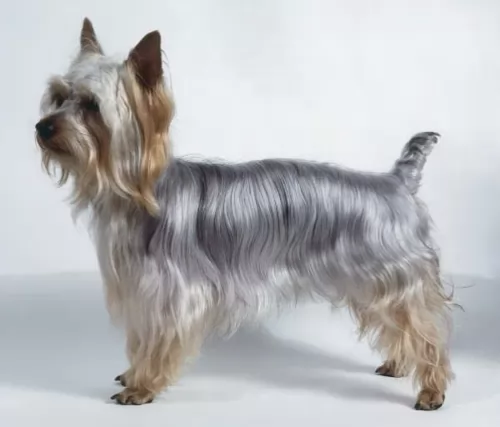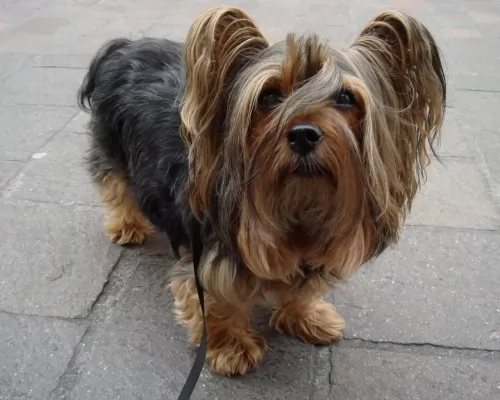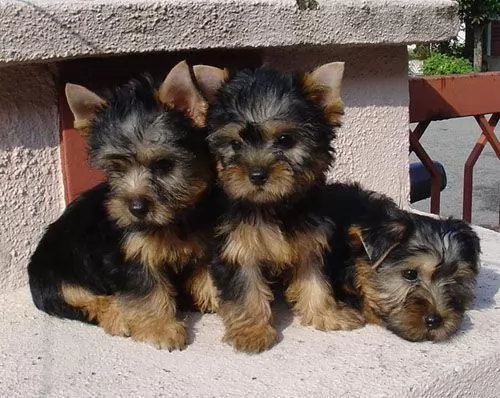 Petzlover
PetzloverBilly is originated from France but Silky Terrier is originated from Australia. Billy may grow 42 cm / 17 inches higher than Silky Terrier. Billy may weigh 27 kg / 60 pounds more than Silky Terrier. Both Billy and Silky Terrier has almost same life span. Both Billy and Silky Terrier has same litter size. Both Billy and Silky Terrier requires Moderate Maintenance.
The Billy (or Billie) Dog is a rare breed developed in France and mostly still only found in France. Created in the 19th century by Monsieur Gaston Hublot de Rivault and named after his home, Chateau de Billy, he is hunting dog of high quality. The Billy dog was developed by crossing the Poitevin’s original three lines – the Larrye, the Ceris and the Montemboeuf. In developing the Billy, Rivault favored the colors found in the Ceris and Montemboeuf strains as opposed to the tricolors of the Larrye strain. The Billy is a scent hound from all the lines leading back to the monks of the Saint Hubert Monastery in the middle ages, in Belgium, then refined in Gaul (France). The Billy line was considered the most elegant French breed and they were the last breed to come from that large scent hound type that the French nobility and royalty loved to breed.
In 1886 the Federation Cynoloquique Internationale established the standard for the Billy breed. The breed was a great hunter with resilience, speed, scenting and fortitude. The Billy hunted in large packs in pursuit of Wild Boar and Roe Deer. This was accomplished by the crossing of great hunters developed for their specific skills. The Ceris was amazing in its skill to hunt down wolves and hares. The Montemboeuf was a large, elegant dog that hunted wild boar and Larrye for his strong scent ability. Since these three breeds were true French breeds, the Billy was a true aristocratic scent hound in a pure scent hound line.
This gregarious, handsome dog became extremely popular in France in the 19th century. Unfortunately, the World Wars of the 20th century would take their toll on this rare breed and they were almost extinct by the late 1900’. There were only two hounds left by the end of the Second World War. Anthony Rivault, the son of Gaston, set about saving the breed by incorporating the lines of Harrier, the Poilevin and the Porcelaine with the two remaining hounds. From there the breed has been revived and is no longer on the verge of extinction. They are still rare and certainly not “popular”, but they are excellent hunters, especially hunting in packs. Today they are considered one of the breeds used to develop the Grand Anglo-Francais Blanc et Orange in France and there are several packs that hunt roe deer in France, while a couple packs are used to hunt wild boar.
 It is the Yorkshire Terrier and the Australian Terrier which are the ancestors of the Australian Silky Terrier. This is by no means a new dog breed. It is believed that the breed came into existence at the end of the 19th century.
It is the Yorkshire Terrier and the Australian Terrier which are the ancestors of the Australian Silky Terrier. This is by no means a new dog breed. It is believed that the breed came into existence at the end of the 19th century.
The dog’s purpose is to be a companion. This little canine wasn’t always known as the Silky Terrier, but in 1955 the name became officially Silky Terrier.
The breed is also recognized by the Australia National Kennel Council in the Toy Group. In fact the breed is recognised by a number of the major kennel clubs as well as the Fédération Cynologique Internationale.
The Billy dog is powerful, beautiful and built extremely well. He is large but he should also be light weight and lean. He has an athletic look, powerful muscles, and strong bones. He has floppy ears, dark eyes with dark rims and a white coat. This breed has a medium size head with a domed forehead and square muzzle. The ears are high on the head, flat and floppy while the neck is long and strong. Shoulders are also long and the back broad, the thighs muscular and the feet round. He has a long fluffy tail. The coat is short and can be seen through to the skin. He has white skin with brown spots and the fur is white or off white. The females are smaller than the males. He is a great family companion as well as a hunter. They have high pitched voices and they can be howlers. They have a strong prey drive and are great hunters. They can be great companion dogs for any family, just watch them with small children and small animals. They are big enough to need a lot of space and a lot of exercise. Scent hounds can be stubborn, and that trait is not lost on the Billy dog.
 This is a small dog breed, standing at just 21 to 26cm in height and weighing in the region of 4 to 5kg. He may be a toy dog, but he is robust and athletic.
This is a small dog breed, standing at just 21 to 26cm in height and weighing in the region of 4 to 5kg. He may be a toy dog, but he is robust and athletic.
The ears of the Silky are small and erect with a lot of silky hair that hangs down and the tail is preferably docked and held high.
His coat is eye-catching – straight, long, silky and shiny. If it is left unclipped, it will reach the floor. The colour of the coat is a tan and silvery grey.
The temperament of any dog is affected by things such as heredity, upbringing and the training and socialization he receives.
Small he may be, but the Silky Terrier can benefit from training as he is feisty and strong willed.
He is energetic and always ready for action. He is ready to come bounding after you and join his human family for any action they’re into. He is playful, bold, loyal, tenacious, independent, social and lively and he makes a good playmate for children.
He might tend to be a bit snappy and aggressive towards other dogs. He is also great as a watchdog, barking and alerting you to strangers.
Even though the Billy Breed is very rare and faced potential extinction it is a terrific sporting dog who loves children, other dogs, and adults. He could be a good family dog if his exercise needs are met. He is social, gregarious, and gentle with people. They are happiest in a pack and do not do well in a one dog household. They form extremely strong bonds with their people and household. They are friendly and outgoing. This makes them a poor choice for guard dog. They have an exceptionally well-developed prey drive do they might be aggressive toward any animal smaller than them. This includes the family cat, other smaller dogs, hamsters etc.
 The silky terrier is a good choice for those who want a smallish dog but one which is robust and adventurous.
The silky terrier is a good choice for those who want a smallish dog but one which is robust and adventurous.
Your Silky is a loyal dog who loves spending time with his human family, wanting their companionship.
He will need to be physically and mentally stimulated as he is bright and intelligent. He can adapt to life in the city or the countryside but will need to be well exercised wherever he is.
Despite their history of almost becoming extinct the Billy dog is a hearty and healthy group. They do tend to get Bronchitis and colds due to the short, thin coat. Keep them indoors during winter. Another area of concern is the ears. They are prone to ear infections so keep their ears clean. They should not be exposed to cold weather. The Billy life expectancy is 10-14 years which is very good for such a large dog.
 Just like most other dogs, the Silky Terrier isn’t likely to get sick easily, but he can still succumb to any one of the dog illnesses there are.
Just like most other dogs, the Silky Terrier isn’t likely to get sick easily, but he can still succumb to any one of the dog illnesses there are.
This is when your pet isn’t able to regulate blood sugar levels. Your dog will be drinking a lot more water than usual and also be urinating more often. The vet will explain to you a special diet for your pet and how the disease can be controlled with insulin.
This is a disease seen more often in smaller dogs like the Silky. It is caused by an obstruction in the airway and symptoms can include labored breathing and coughing. Your dog will need to be treated with anti-biotics and possibly surgery.
The Billy dog is large, muscular and lean. Do not overfeed him, but you can safely free feed. Watch to be sure he does not gain too much weight and if he does go to two feedings per day.
As previously mentioned this is a healthy, long-lived dog. Watch for ear infections and keep him out of extreme cold.
This is a very athletic, active hunter, who needs a lot of exercise. Daily walks are good, but he needs 45 to 60 minutes of exercise every day. Remember he was bred to hunt and loves to do so. Find activities that let him use his athletic skills and strong sense of smell. He needs a big yard to romp in. He will excel at obedience, barn hunt and agility. A lure game might be good also, but he would be happier with a scent oriented “find it” game.
 You can imagine that with that silky hair, you’re going to have to be brushing your furry friend quite a bit. It’s such soft, silky hair that it easily picks up burrs and gets matted. You may want to get your pet to a professional groomer to have the hair cut. As you brush him, check for any unusual lumps and keep an eye on his skin.
You can imagine that with that silky hair, you’re going to have to be brushing your furry friend quite a bit. It’s such soft, silky hair that it easily picks up burrs and gets matted. You may want to get your pet to a professional groomer to have the hair cut. As you brush him, check for any unusual lumps and keep an eye on his skin.
Check your pet’s teeth. Bad teeth can cause bacteria that can affect every part of your dog’s body. Check inside his ears for redness and check his eyes that there is no discharge. Trim the nails. If you don’t have the time or the inclination to do all these things for him, make an appointment with the professional pet groomers who will do it for you.
The Silky Terrier will need quality food if you want him to enjoy a long, healthy life. Its always a good idea to have some of the top quality commercially manufactured dog foods with you for convenience. If you want to give him the best there is, some home-made food will be a good choice, if you keep it simple.
Boiled chicken, brown rice or pasta and spinach, sweet potatoes and carrots are a healthy choice for your pet – plain and simple without any exotic spices that could upset his stomach. Your dog will lap it up and you will see how he loves it. Chop the home-made food up and add some of it into his dry kibble as a treat twice a week.